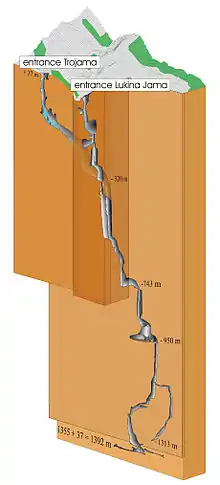Velebit caves
The Velebit mountains of Croatia have several deep caves with some of the world's largest subterranean vertical drops.

The "Lukina jama" cave is 1431 m deep (2013), the deepest cave in Croatia, 14th deepest cave in the world and the deepest cave in southeast Europe.[1] At its foot, there are ponds and streams including one of the largest known colonies of subterranean leeches (Erpobdella mestrovi), which has been ascertained to represent a new species, genus and also family.[1] Other species discovered in the system, include the air-breathing land snails Zospeum tholussum.[2] Like Lukina jama, Slovacka jama, Velebita and Meduza are also located at the "Hajdučki i Rožanski kukovi" special reserve, a dedicated part of the Sjeverni Velebit national park.
Other notable caves include the "Slovacka jama" (Slovak pit), (1,320 m deep), "Velebita" (1026 m deep with underground free fall vertical drop of 513 metres ) and "Meduza" (679 m deep).
The vertical shaft "Patkov Gušt", named after a deceased Croatian speleologist[3] is 553 meters deep and the second deepest pitch in the world as of 2007.
See also
References
- Radovan Radovinovič, The Croatian Adriatic Tourist Guide, pg. 143, Zagreb (1999), ISBN 953-178-097-8
- Alexander M. Weigand (2013). "New Zospeum species (Gastropoda, Ellobioidea, Carychiidae) from 980 m depth in the Lukina jama–Trojama cave system (Velebit Mts., Croatia)" (PDF). Subterranean Biology. 11: 45–53. doi:10.3897/subtbiol.11.5966.
- D.Bakšić, A.Bakšić (2008). "Speleological exploration of pit Patkov gušt". Croatian speleological server. Retrieved 9 June 2012.
External links